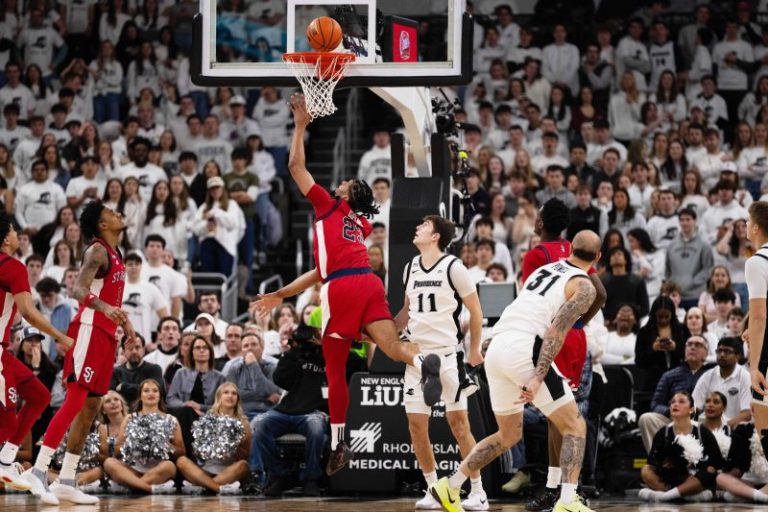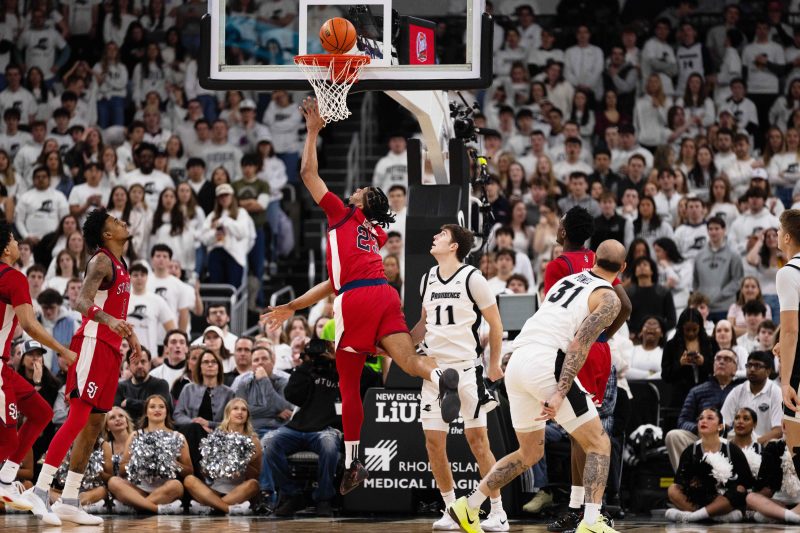
MILAN — It’s Saturday, Feb. 14, at the 2026 Winter Olympics and we’re underway on Valentine’s Day at the Milano Cortina Games.
Friday’s action was defined by one of the most stunning moments of these Games: Ilia Malinin’s meltdown in the free skate of the men’s singles competition. Will Saturday bring that level of drama?
Getting things started, American women won a pair of medals in freestyle skiing as Jaelin Kauf and Elizabeth Lemley scored silver and bronze in the dual moguls competition. Then, the U.S. men’s hockey team defeated Denmark 6-3, with six different players scoring goals in the win.
USA TODAY Sports has a team of more than a dozen journalists on the ground in Italy to bring you behind the scenes with Team USA and keep you up to date with every medal win, big moment and triumphant finish. Get our Chasing Gold newsletter in your inbox every morning and join our WhatsApp channel to get the latest updates right in your texts.
USA TODAY Sports provided highlights of Day 8 at the 2026 Winter Olympics:
U.S. hockey defeats Denmark 6-3
After trailing 2-1 early in the first period, the United States’ offense comes together and overwhelms Denmark, ending in a 6-3 win to move the U.S. to 2-0 at the Olympics so far. Six different players scored for Team USA.
Team USA hockey leads Denmark 4-3 after 2nd period
It’s raining goals in United States vs. Denmark men’s hockey, as Team USA leads 4-3 after the first two periods. The Americans trailed 2-1 after the first period, but scored three goals in the second period and allowed two others to lead 4-3.
Matt Boldy, Brady Tkachuk, Jack Eichel and Noah Hanifan have all scored for the U.S. so far. – Austin Curtright
Team USA misses women’s freeski big air final
LIVIGNO – Grace Henderson was the best chance for the U.S. women’s free ski big air qualifiers with a first jump that resulted in an 86.75. But a mediocre second hit and a fall on her third jump meant no American would be moving on.Avery Krumme, the lone American who qualified for the slopestyle final, had a nice first jump but couldn’t capitalize and did not make finals.
Rell Harwood, who saved herself for big air as she comes back from an ACL injury, could not put down her first run and the last two simply weren’t enough to be in the top 12 that made it to finals.Marin Hamill also did not make the top 12.
Eileen Gu was the first of 27 athletes to jump and landed her first one before crashing on her second. The American-born Chinese competitor popped right back up needing a successful third jump to have the chance to defend her gold medal from four years ago. She nailed it and finished as the No. 2. qualifier.
Canada’s Megan Oldham won bronze in the slopestyle event earlier this week, with Gu (silver) and Switzerland’s Mathilde Gremaud (gold) placing above her. Oldham was the top qualifier with Gu and Gremaud, respectively, behind her. – Chris Bumbaca
Austria’s Janine Flock wins gold in skeleton
CORTINA D’AMPEZZO, Italy – Team USA skeleton athletes Kelly Curtis and Mystique Ro finish 12th (3:52.13) and 15th (3:52.48), respectively, out of 25 sleds. Curtis’ Olympic best performance (she finished 21st in Beijing) comes just over two years after giving birth to her daughter Maeve in Nov. 2023.
Austrian Janine Flock, in her fourth Olympic Games and first medal winning slide, topped the podium with a golden time of 3:49.02. Germany’s Susanne Kreher won silver (3:49.32), and her teammate Jacqueline Pfeifer won bronze (3:49.46) – Payton Titus
Mikaela Shiffrin lines up third for Olympic giant slalom run
CORTINA D’AMPEZZO, Italy — Mikaela Shiffrin will get one of the first cracks at the giant slalom course.
Shiffrin will start third in the GS race at the 2026 Milano Cortina Olympics on Sunday, Feb. 15. Paula Moltzan, who won bronze with Jackie Wiles in the team combined, is just behind her at No. 5, and Nina O’Brien will start 11th. A.J. Hurt is the last American in the race, starting 23rd.
The start order for the second run will be reverse order of the results from the first.
The GS is the first of the tech races, though Shiffrin, Moltzan, and Hurt all did slalom runs in the team combined. Shiffrin will be looking for a better result in the GS after notably struggling in the team combined, finishing 15th out of 18.- Nancy Armour
Marie-Philip Poulin ties hockey record, Canadian women advance to semis
Canada women’s hockey captain Marie-Philip Poulin scored a goal in her return from a lower-body injury on Saturday. That ties her with Hall of Famer Hayley Wickenheiser for most career Olympic women’s hockey goals (18).
Canada beat Germany 5-1 to advance to the semifinals, where it will face the winner of Finland-Switzerland. The USA will face Sweden. – Mike Brehm
Stolz sets Olympic record in 500, earns second gold medal
MILAN — Jordan Stolz resumed his quest for four gold medals at the 2026 Winter Olympics.
And on it goes.
Stolz captured his second gold by winning the men’s 500 meters at Milano Speed Skating Stadium on Saturday, Feb. 14, setting an Olympic record while he was at it.
Paired with Jenning de Boo of the Netherlands, Stolz finished with a time of 33.79 seconds, another Olympic record for the 21-year-old from Wisconsin.
To secure four gold medals, Stolz must win his final two races – the 1,500 meters on Thursday, Feb. 19, and the mass start on Saturday, Feb. 21.
Stolz won his first Olympic gold here in the men’s 1,000 meters on Wednesday, Feb. 11, while setting a new Olympic record. — Josh Peter
Pressure can topple even the best, as Ilia Malinin can attest
In December, before the U.S. figure skating championships, USA TODAY Sports’ Christine Brennan asked Ilia Malinin what seemed like an unfathomable question: Do you ever think about not winning the 2026 Winter Olympics gold medal?
It seemed silly. Malinin was figuratively being handed the gold medal before he even crossed the Atlantic Ocean. But to some surprise, it had crossed his mind.
“Sometimes, I have those thoughts a little bit,” Malinin. “It’s like everyone expects you to be so perfect, and really know what you’re doing all the time, but sometimes you’re not always perfect.’
Malinin’s golden moment turned into disaster, with a tough performance resulting in an eighth place finish in the men’s singles, a result the entire figure skating world is still trying to understand. − Jordan Mendoza
Team USA speed skating advances to women’s team pursuit semifinals
Giorgia Birkeland, Brittany Bowe and Mia Manganello advanced to the semifinal round in the women’s team pursuit at the Milano Speed Skating Stadium.The trio posted a time of 2:58.32, 3.29 seconds behind the top speed of 2:55.03 by Canada. Japan (2:55.52) and Netherlands (2:55.65) also moved on to the semifinal round, which is scheduled for Tuesday.
Jordan Stolz set to compete for second speed skating gold
Jordan Stolz returns to the Milano Speed Skating Stadium to renew his pursuit of four Olympic gold medals at 2026 Winter Games.
After winning his first gold in the men’s 1,000 meters on Wednesday, Sotlz’s quest continues today with the men’s 500 meters (11 a.m. ET start, Peacock).
The field of 30 skaters is considered to be strong, and Stolz, the 21-year-old from Wisconsin, is not the runaway favorite. Though he’s a two-time world champion at the distance and won the season World Cup title again this year, he ‘only’ won five of the nine 500-meter races.
To secure four golds, Stolz would need to win not only the 500 meters, but also the 1,500 meters on Thursday and the mass start next Saturday. − Josh Peter
Armour: Olympics not the only way to define greatness
The Olympic podium is not the end-all, be-all. Even the Olympics themselves cannot define an athlete’s career.
It can seem that way, when the eyes of the world are trained on these 16 days and one moment – a medal, an act of sportsmanship, a catastrophe – has the power to change an athlete’s life. But that white-hot spotlight that burns athletes up at the Olympics as often as it elevates them is our failure, the result of our ignorance.
We expect these athletes to deliver like show ponies during the Olympics – ignoring they’ve got an entire body of work outside the Games – and are ruthless when they don’t.
Mikaela Shiffrin could put away her skis today and there would be little question that she’s the greatest skier of all time. Her legacy has long been secured, and nothing that happens at these 2026 Milano Cortina Olympics – good, bad or indifferent – will change that.
And yet, Shiffrin has already come in for criticism at these Olympics after a disastrous slalom run in the team combined.
She’s not the only one, columnist Nancy Armour writes.
Winter Olympics power couples celebrate Valentine’s Day in Italy
Snow isn’t the only thing in the air at the 2026 Milano Cortina Winter Olympics.
There will be no shortage of love as power couples gear up for the Games together. The Olympics run through Valentine’s Day (Feb. 14) and some competitors won’t have to spend the holiday apart from their significant other.
‘The skating career is short and finite, but the relationship is much, much longer,’ said Evan Bates, one half of the husband-and-wife ice dancing duo with Madison Chock. ‘The appreciation for everything that we’ve gone through over 15 years has grown as maybe you get closer towards the end.’
We take a look at a few of the most notable partnerships at the 2026 Winter Olympics. − Cydney Henderson
Luger Ashley Farquharson calls for greater access to winter sports
Growing up in Park City, Utah, home of several sports for the 2002 Winter Olympics, Ashley Farquharson was surprised to learn not everyone in America knew what luge was.
As she’s gotten older, Farquharson has realized her experience was the unique one. With access to the same venues used in 2002 and after school programs like the Youth Sports Alliance (YSA), 41 Park City athletes are competing in the 2026 Winter Olympics. Farquharson, 26, said she’s part of the first generation to benefit from 2002’s legacy.
Looking ahead to 2034, when the Olympics return to Utah, Farquharson is passionate about making winter sports more accessible. − Payton Titus
Lucas Pinheiro Braathen wins historic gold for Brazil
South America has its first medal ever in the Winter Olympics, and it’s gold.
Alpine skier Lucas Pinheiro Braathen, a native of Norway who now competes for Brazil (his mother’s country), won the men’s giant slalom at Stelvio Ski Centre in Bormio to make history.
Pinheiro Braathen was the first skier on the hill during the morning’s opening run, and he used that leadoff spot to throw down a sizzling 1:13.92. Switzerland’s star Marco Odermatt was the only competitor to get within 1.57 seconds of that time, and even he was nearly a second (0.95) behind Pinheiro Braathen.
It was clearly the Brazilian’s gold medal to lose entering the afternoon’s second run, and he didn’t lose it, finishing ahead of Odermatt, the silver medalist, by 0.58 seconds. Though there were still skiers left to compete following Pinheiro Braathen’s run, the results were all but official. − Gentry Estes
What happened to Ilia Malinin?
It was set to be a coronation inside Milano Ice Skating Arena. The American prodigy, the “Quad God” Ilia Malinin, was going to take his place in figure skating lore and become the 2026 Winter Olympic champion.
All was well — until it was time to take the ice.
“Going into that starting post,” Malinin said. “I just felt like all the traumatic moments of my life really just started flooding my head. There’s just so many negative thoughts that just flooded into there.
‘I just did not handle it.’
It was a stunner in the men’s singles free skate. Not only did the 21-year-old U.S. star not win gold, but he didn’t even reach the podium, finishing in eighth place, the worst competition result of his senior career since March 2022.
There are so many questions as to what happened. − Jordan Mendoza
Live 2026 Winter Olympics medal count
USA TODAY Sports is keeping track of all the medals won at the Milano Cortina Games with live updates as they’re awarded.
Here’s the current top 10 in the medal count, as of 8:07 a.m. ET:
- Norway: 19 Total (9 Gold, 3 Silver, 7 Bronze)
- Italy: 18 Total (6 Gold, 3 Silver, 9 Bronze)
- United States: 16 Total (4 Gold, 8 Silver, 4 Bronze)
- Japan: 14 Total (3 Gold, 3 Silver, 8 Bronze)
- Austria: 12 Total (3 Gold, 6 Silver, 3 Bronze)
- Germany: 11 Total (4 Gold, 4 Silver, 3 Bronze)
- France: 10 Total (4 Gold, 5 Silver, 1 Bronze)
- Sweden: 9 Total (4 Gold, 4 Silver, 1 Bronze)
- Switzerland: 7 Total (4 Gold, 1 Silver, 2 Bronze)
- Netherlands: 7 Total (3 Gold, 3 Silver, 1 Bronze)
Sweden overcomes disaster to medal in cross-country relay; USA 5th
Team USA finished fifth in the women’s 4 x 7.5km relay amid tough, rainy conditions at the Tesero Cross-Country Skiing Stadium.
The American relay team — made up of Julia Kern, Rosie Brennan, Novie McCabe and Jessie Diggins — finished behind Norway (gold), Sweden (silver) and Finland (bronze).
Sweden’s Ebba Andersson opened the door for Norway in the second leg after suffering two separate crashes. The second crash was brutal and ripped the binding off her right ski. Andersson had to race a portion of the course on one ski before meeting a technician on the course to switch out her gear. But the Swedes were able to recover to claim silver.
‘It’s so wet out there,’ Kern said, according to the NBC broadcast. ‘These are the worst conditions we’ve had here in Tesero.” − Cydney Henderson
USA’s Kauf, Lemley take silver, bronze in women’s dual moguls
The USA claimed a pair of medals in the most exciting addition to the 2026 Milano Cortina Winter Olympics program, dual moguls.
Jaelin Kauf reached the podium again in freestyle skiing, taking another silver. It’s the third Olympic medal (all silver) of her career, following a silver in the individual competition at these Olympics and in 2022 at the Beijing Games. Australia’s Jakara Anthony overcame a fall in the final of the individual competition to win gold.
Fellow American Liz Lemley won the bronze medal after narrowly edging France’s Perrine Laffont in the ‘small final.’ It’s Lemley’s second medal of these Games after she took the gold in individual moguls.
The United States made up half of the quarterfinalists with Tess Johnson and Olivia Giaccio joining Kauf and Lemley. − Chris Bumbaca
Women’s freestyle skiing: Jaelin Kauf, Elizabeth Lemley into dual moguls semifinals
Jaelin Kauf will face France’s Perrine Laffont, while Elizabeth Lemley will take on Australia’s Jakara Anthony in the semifinals of the women’s dual moguls. Americans Tess Johnson and Olivia Giaccio were eliminated in the quarterfinals.
Alpine skiing: Brazil seeking history in men’s giant slalom
As the first of two runs in the men’s giant slalom nears an end, a heck of a story is shaping up at the Stelvio Ski Centre in Bormio.
Lucas Pinheiro Braathen, a skier who represents Brazil, has opened up a lead of nearly a full second over the rest of the field. That has put him in position to claim the first-ever Winter Olympics medal for a South American nation in this afternoon’s final run.
American medal hopeful River Radamus is in 12th, a total of 2.46 seconds back of the leader – but less than a second away from third place.
‘I’m in the mix,’ Radamus said. ‘I know I’ve got a punchers’ chance at it, and I have nothing to lose. So I’ll give it all I’ve got next run.’
Of the two other USA skiers in the giant slalom: Ryder Sarchett is 4.80 seconds behind and currently in 29th place, Kyle Negomir is out after failing to make it through his first try through the slalom gates.
Pinheiro Braathen was born in Norway and originally competed under that flag before retiring abruptly at age 23. He returned to ski for Brazil, his mother’s native country, and has continued to be one of the world’s top-rated slalom skiers.
Can anyone catch him during the second run?
‘If he has a good run, it’s going to be nearly impossible almost, the way he’s skiing,’ said Team USA’s Sarchett. — Gentry Estes
Women’s freestyle skiing: Four Americans into dual moguls quarterfinals
Jaelin Kauf, Tess Johnson, Olivia Giaccio and Elizabeth Lemley make up half of the final eight in women’s dual moguls. None of the four Americans will face each other in the quarterfinals.
Hockey schedule, scores
Olympic men’s hockey schedule and scores today
All times Eastern and accurate as of Friday, Feb. 13, 2026, at 5:30 p.m.Watch it here: Stream your favorite shows, the biggest blockbusters and more.
- 6:10 a.m. – Sweden vs. Slovakia , Group B on CNBC, Peacock
- 6:10 a.m. – Germany vs. Latvia, Group C on CNBC, Peacock
- 10:40 a.m. – Finland vs. Italy, Group B on USA, Peacock
- 3:10 p.m. – USA vs. Denmark, Group C on USA, Peacock
River Radamus struggles out of the gate in giant slalom
Team USA’s River Radamus got off to an inauspicious start at the giant slalom on Day 8, finishing +2.46 on his first run.
Where to watch Olympics today
Watch all 2026 Winter Olympics events on NBC and Peacock.
Watch Olympics on Peacock
Olympics schedule today
All times Eastern and accurate as of Friday, Feb. 13, 2026, at 6:34 p.m.
- 3:00 a.m. – Ski Jumping: Women’s Large Hill Official Training 2, Predazzo Ski Jumping Stadium (Val di Fiemme)
- 3:05 a.m. – Curling: Women’s Round Robin – ITA vs.CHN, Cortina Curling Olympic Stadium (Cortina d’Ampezzo)
- 3:05 a.m. – Curling: Women’s Round Robin – GBR vs. CAN, Cortina Curling Olympic Stadium (Cortina d’Ampezzo)
- 3:05 a.m. – Curling: Women’s Round Robin – SUI vs. JPN, Cortina Curling Olympic Stadium (Cortina d’Ampezzo)
- 4 a.m. – Bobsleigh: Women’s Monobob Official Training Heats 5 & 6, Cortina Sliding Centre (Cortina d’Ampezzo)
- 4 a.m. – Alpine Skiing: Men’s Giant Slalom (Runs 1 & 2) – medal event, Stelvio Ski Centre (Bormio, Valtellina)
- 4:30 a.m. – Freestyle Skiing: Women’s Dual Moguls Quarters, Semis, Finals – medal event, Livigno Aerials & Moguls Park (Livigno, Valtellina)
- 6 a.m. – Cross-Country Skiing: Women’s 4 x 7.5km Relay – medal event, Tesero Cross-Country Skiing Stadium (Val di Fiemme)
- 6:10 a.m. – Ice Hockey: Men’s Preliminary (GER vs. LAT), Anterselva Biathlon Arena (Antholz)
- 6:10 a.m. – Ice Hockey: Men’s Preliminary (SWE vs. SVK), Milano Santagiulia Ice Hockey Arena
- 6:30 a.m. – Bobsleigh: 2-man Official Training Heats 5 & 6, Cortina Sliding Centre (Cortina d’Ampezzo)
- 8:05 a.m. – Curling: Men’s Round Robin – GER vs. USA, Cortina Curling Olympic Stadium (Cortina d’Ampezzo)
- 8:05 a.m. – Curling: Men’s Round Robin – CZE vs. GBR, Cortina Curling Olympic Stadium (Cortina d’Ampezzo)
- 8:05 a.m. – Curling: Men’s Round Robin – SWE vs. CHN, Cortina Curling Olympic Stadium (Cortina d’Ampezzo)
- 8:05 a.m. – Curling: Men’s Round Robin – SUI vs. CAN, Cortina Curling Olympic Stadium (Cortina d’Ampezzo)
- 8: 45 a.m. – Biathlon: Women’s 7.5km Sprint – medal event, Anterselva Biathlon Arena (Antholz)
- 10 a.m. – Speed Skating: Women’s Team Pursuit Quarterfinals, Milano Speed Skating Stadium (Rho, Milan)
- 10:40 a.m. – Ice Hockey: Men’s Preliminary (FIN vs. ITA), Milano Santagiulia Ice Hockey Arena
- 10:40 a.m. – Ice Hockey: Women’s Quarterfinals, Milano Rho Ice Hockey Arena
- 11 a.m. – Speed Skating: Men’s 500m – medal event, Milano Speed Skating Stadium (Rho, Milan)
- 12 p.m. – Skeleton: Women’s Heats 3 & 4 – medal event, Cortina Sliding Centre (Cortina d’Ampezzo)
- 12:45 p.m. – Ski Jumping: Men’s Large Hill 1st Round, Final – medal event, Predazzo Ski Jumping Stadium (Val di Fiemme)
- 1:05 p.m. – Curling: Women’s Round Robin – CAN vs. SUI, Cortina Curling Olympic Stadium (Cortina d’Ampezzo)
- 1:05 p.m. – Curling: Women’s Round Robin – JPN vs. USA, Cortina Curling Olympic Stadium (Cortina d’Ampezzo)
- 1:05 p.m. – Curling: Women’s Round Robin – KOR vs. DEN, Cortina Curling Olympic Stadium (Cortina d’Ampezzo)
- 1:05 p.m. – Curling: Women’s Round Robin – ITA vs. SWE, Cortina Curling Olympic Stadium (Cortina d’Ampezzo)
- 1:30 p.m. – Freestyle Skiing: Women’s Freeski Big Air Qualification Runs 1, 2, 3, Livigno Snow Park (Livigno, Valtellina)
- 2:15 p.m. – Short Track: Women’s 1000m, Men’s 15000m Heats, Semifinals, Finals (Medal Events), Milano Ice Skating Arena (Milan)
- 3:10 p.m. – Ice Hockey: Men’s Preliminary (USA vs. DEN), Milano Santagiulia Ice Hockey Arena
- 3:10 p.m. – Ice Hockey: Women’s Quarterfinals, Milano Rho Ice Hockey Arena
Meet Team USA 2026: Get to know the athletes behind the games
More 2026 Winter Olympics
See the full Milano Cortina Games schedule
See the 2026 Medal Count Here
This post appeared first on USA TODAY




















